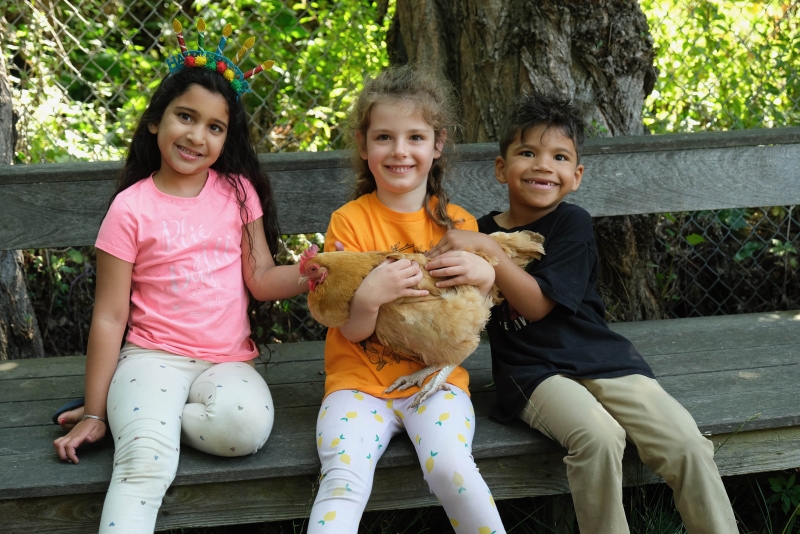Social Emotional Learning
Social emotional learning (SEL) is infused throughout the curriculum, from understanding multiple historical perspectives in a social studies class, to interpreting a character’s motivation in a novel, to discussing ethical research in scientific studies. The School has developed five competency areas for students: self-reflection and self-awareness, self-regulation, social awareness, responsible decision-making, and healthy relationships. These competencies inform our SEL lessons and discussions, while still leaving room for teachers and counselors to be responsive to a class or student’s needs at any given time.
Kindergarten
Social emotional learning (SEL) centers on helping children recognize and manage emotions in themselves, practice self-regulation, and learn basic social skills. At this age, children are developing self-awareness and starting to understand how their actions affect others. SEL classes support the development of empathy, cooperation, and communication, laying the foundation for healthy relationships and positive self-esteem. On any given day, kindergarteners may discuss read-alouds about the qualities of a good friend; learn improv games that target skills like impulse control; or orbit the room with hula hoops to practice the concept of personal space.

1st Grade
Children form deeper friendships, show increased empathy, and begin to understand fairness and rules. They learn to manage frustration and express their feelings with words rather than actions. Their sense of right and wrong becomes more defined. In this age of perfectionism (fear of failure, getting frustrated with mistakes, and avoiding things that look too hard), SEL classes guide growth by teaching, modeling, and practicing strategies for cooperation, emotional regulation, and conflict resolution. Students ponder the differences between joking and teasing, play cooperative games, or role play ways to negotiate during a group project.

2nd Grade
At this age, students often worry about doing things correctly, seek reassurance, and respond well to clear expectations and encouragement. They become more socially adventurous and opinionated, showing increased awareness and independence. At this stage, children are more capable of understanding others’ perspectives, managing emotions with support, and solving interpersonal problems with guidance. Students strengthen their emotional vocabulary, develop responsible decision making, and practice teamwork. Students do mindfulness activities to help with winning or losing graciously, play improv games to practice entering and exiting social situations, or brainstorm self-regulation strategies for when big feelings arise.

3rd Grade
Students thrive on approval and often enjoy structure. They can be sensitive to criticism and benefit from reassurance. With increasing independence and social awareness, they compare themselves to peers, which can impact self-esteem and social interactions. SEL helps students manage more complex emotions, navigate peer dynamics, and take greater responsibility for their actions. They engage in deeper reflection, consider multiple viewpoints, and practice conflict resolution with less adult intervention. Students play a task initiation game after reading a book about executive functioning, role play skits around acceptance vs. rejection, or create an anchor chart comparing positive and negative self-talk statements.

4th Grade
Students grow rapidly in self-awareness, independence, and social complexity. They develop stronger moral reasoning and seek fair solutions. They can be sensitive to peer opinions and may show self-doubt, benefiting from encouragement and reassurance. Children become more capable of abstract thinking, self-reflection, and handling new responsibilities. SEL helps students manage academic and social expectations by strengthening emotional regulation, problem solving, and communication skills. Children are more able to resolve conflicts independently and reflect on how their actions affect the group. They identify SEL principles in the books they read, practice nonverbal communication, or make informational slideshows for their puberty unit.

5th Grade
Students take on more responsibility but need support in self-reflection and regulation. They practice leadership skills and responsible decision making in mixed-grade activities and increasingly see the world from different perspectives.
In participating in The Mosaic Project’s outdoor education program, students learn values (mutual respect, open-mindedness, self-respect, attitude, individuality, community) that guide the creation of a peaceful and inclusive community. Fifth graders practice assertive communication, identifying elements of a healthy relationship and understanding the difference between impact and intent. SEL is supported by classroom lessons by the school counselor. Students and their parenting adults participate in puberty education.

6th Grade
The transition to middle school can be exciting and challenging for a variety of reasons: starting at a new school, having multiple teachers, academic demands, and multiple deadlines. SEL centers around how to navigate the transition to middle school and what makes a community strong. In a weekly SEL/Study Skills class, students learn about what makes themselves and their community resilient and welcoming. Skills include effective communication, forging friendships, managing strong emotions, organization, group work, sharing identity stories, understanding ourselves and each other. Students also receive comprehensive sex education each year.

7th Grade
SEL centers on academic demands, shifting relationships and values clarifications. Exploration of “What Makes a Strong Community?” continues, and students focus on the theme of choices and consequences. Lessons delve into situations teens may encounter and how to make healthy choices (e.g., response to pressure and stress, how inclusive vs. exclusive behaviors impact belonging, decreasing mental health stigma, celebrating neurodiversity, and identifying key elements of a healthy relationship with others and to the self). The curriculum is rooted in Positive Psychology which emphasizes strengths that enable individuals and communities to thrive. Comprehensive sex education continues.

8th Grade
SEL prepares students for the transition to high school, increased independence, greater social awareness, and responsible decision making. Students participate in a weekly seminar with the middle school head, high school guidance counselor and school counselor in which they strengthen self-advocacy, time management, and organization skills that will support the high school admissions process. Students work on interview skills, email communication, and assessment of needs and interests in choosing a high school. The seminar also covers improv and public speaking, mental health, understanding the adolescent brain, substance education, healthy relationships, and sexuality education.

Kindergarten
Social emotional learning (SEL) centers on helping children recognize and manage emotions in themselves, practice self-regulation, and learn basic social skills. At this age, children are developing self-awareness and starting to understand how their actions affect others. SEL classes support the development of empathy, cooperation, and communication, laying the foundation for healthy relationships and positive self-esteem. On any given day, kindergarteners may discuss read-alouds about the qualities of a good friend; learn improv games that target skills like impulse control; or orbit the room with hula hoops to practice the concept of personal space.

1st Grade
Children form deeper friendships, show increased empathy, and begin to understand fairness and rules. They learn to manage frustration and express their feelings with words rather than actions. Their sense of right and wrong becomes more defined. In this age of perfectionism (fear of failure, getting frustrated with mistakes, and avoiding things that look too hard), SEL classes guide growth by teaching, modeling, and practicing strategies for cooperation, emotional regulation, and conflict resolution. Students ponder the differences between joking and teasing, play cooperative games, or role play ways to negotiate during a group project.

2nd Grade
At this age, students often worry about doing things correctly, seek reassurance, and respond well to clear expectations and encouragement. They become more socially adventurous and opinionated, showing increased awareness and independence. At this stage, children are more capable of understanding others’ perspectives, managing emotions with support, and solving interpersonal problems with guidance. Students strengthen their emotional vocabulary, develop responsible decision making, and practice teamwork. Students do mindfulness activities to help with winning or losing graciously, play improv games to practice entering and exiting social situations, or brainstorm self-regulation strategies for when big feelings arise.

3rd Grade
Students thrive on approval and often enjoy structure. They can be sensitive to criticism and benefit from reassurance. With increasing independence and social awareness, they compare themselves to peers, which can impact self-esteem and social interactions. SEL helps students manage more complex emotions, navigate peer dynamics, and take greater responsibility for their actions. They engage in deeper reflection, consider multiple viewpoints, and practice conflict resolution with less adult intervention. Students play a task initiation game after reading a book about executive functioning, role play skits around acceptance vs. rejection, or create an anchor chart comparing positive and negative self-talk statements.

4th Grade
Students grow rapidly in self-awareness, independence, and social complexity. They develop stronger moral reasoning and seek fair solutions. They can be sensitive to peer opinions and may show self-doubt, benefiting from encouragement and reassurance. Children become more capable of abstract thinking, self-reflection, and handling new responsibilities. SEL helps students manage academic and social expectations by strengthening emotional regulation, problem solving, and communication skills. Children are more able to resolve conflicts independently and reflect on how their actions affect the group. They identify SEL principles in the books they read, practice nonverbal communication, or make informational slideshows for their puberty unit.

5th Grade
Students take on more responsibility but need support in self-reflection and regulation. They practice leadership skills and responsible decision making in mixed-grade activities and increasingly see the world from different perspectives.
In participating in The Mosaic Project’s outdoor education program, students learn values (mutual respect, open-mindedness, self-respect, attitude, individuality, community) that guide the creation of a peaceful and inclusive community. Fifth graders practice assertive communication, identifying elements of a healthy relationship and understanding the difference between impact and intent. SEL is supported by classroom lessons by the school counselor. Students and their parenting adults participate in puberty education.

6th Grade
The transition to middle school can be exciting and challenging for a variety of reasons: starting at a new school, having multiple teachers, academic demands, and multiple deadlines. SEL centers around how to navigate the transition to middle school and what makes a community strong. In a weekly SEL/Study Skills class, students learn about what makes themselves and their community resilient and welcoming. Skills include effective communication, forging friendships, managing strong emotions, organization, group work, sharing identity stories, understanding ourselves and each other. Students also receive comprehensive sex education each year.

7th Grade
SEL centers on academic demands, shifting relationships and values clarifications. Exploration of “What Makes a Strong Community?” continues, and students focus on the theme of choices and consequences. Lessons delve into situations teens may encounter and how to make healthy choices (e.g., response to pressure and stress, how inclusive vs. exclusive behaviors impact belonging, decreasing mental health stigma, celebrating neurodiversity, and identifying key elements of a healthy relationship with others and to the self). The curriculum is rooted in Positive Psychology which emphasizes strengths that enable individuals and communities to thrive. Comprehensive sex education continues.

8th Grade
SEL prepares students for the transition to high school, increased independence, greater social awareness, and responsible decision making. Students participate in a weekly seminar with the middle school head, high school guidance counselor and school counselor in which they strengthen self-advocacy, time management, and organization skills that will support the high school admissions process. Students work on interview skills, email communication, and assessment of needs and interests in choosing a high school. The seminar also covers improv and public speaking, mental health, understanding the adolescent brain, substance education, healthy relationships, and sexuality education.




